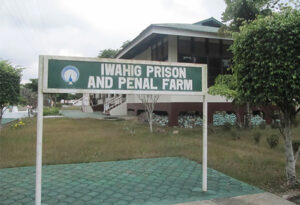By Chloe Mari A. Hufana, Reporter
PUERTO PRINCESA, Palawan — About P7 billion is needed to develop the Iwahig Prison and Penal Farm (IPPF) in Puerto Princesa, Palawan, into a mega ecozone, the Bureau of Corrections (BuCor) said on Sunday.
Director General Gregorio Pio P. Catapang, Jr. told reporters they aim to build an airport and port within the 28,300-hectare prison facility, in line with its partnership with the Philippine Economic Zone Authority (PEZA).
He said they aim to allot 1,000 hectares for the secondary airport in Palawan’s capital city, almost double the size of the Ninoy Aquino International Airport complex of 600 hectares.
The estimated cost to fast-track these goals by 2028 is between P6 billion and 7 billion, Mr. Catapang said.
“We just received a memo to fast-track it. There was apparently a meeting — the President called for a meeting with all department heads. Our Justice Secretary, Jesus Crispin C. Remulla, also echoed the concern [on the budget],” he told BusinessWorld in Filipino.
“The budget is insufficient. Although we are given P1 billion, it’s not enough to set up the facilities we need. They have designed an additional budget of between P6 and P7 billion for this year just to speed things up.”
The airport will be located in the second zone, a PEZA zone, where the agencies eye building a hub bigger than Puerto Princesa Airport.
“The second zone [where we’ll build the airport], that is a PEZA zone, and there will be an airfield that can accommodate more passengers,” he said.
“In the meantime, Puerto Princesa [Airport] will suffice… There will come a time when even the expansion of the current airport won’t be sufficient. What we want is for this big airport to become the hub, and then from that big airport, they can take a smaller plane to El Nido, Coron,” he added in mixed English and Filipino.
PEZA and BuCor signed a memorandum of agreement on Jan. 24 to develop an economic zone within the IPPF.
It designated an initial area of over 2,000 hectares from the 28,300-hectare property.
In addressing energy problems in the country’s largest province, Mr. Catapang said the President instructed them to tap solar and water resources.
“The guidance from Secretary Remulla is, first, to secure the water resource rights,” he added. “Second, we need a presidential proclamation for PEZA to ensure that the PEZA zone is not only approved by PEZA but also by the President.”
REINTEGRATING IWAHIG INMATESMoreover, the IPPF said it has partnered with the Technical Education Skills and Development Authority for prisoners to obtain a National Certificate Level 2 as well as started teaching them practical skills, such as farming.
When they finally serve their sentences, they can be hired with the proper skills and certifications to be a working member of society.
According to IPPF’s Superintendent, Gary E. Garcia, the prison earned P5 million in the full year 2024 for its rice harvests alone. It also has livestock and fishing on the property.
In total, it earned about P10 million in 2024, which the IPPF aims to surpass this year.
He said they initially cultivated 60 hectares of rice fields in 2024. This year, Mr. Garcia noted, the area has expanded to 100 hectares.
“IPPF, aside from its vast area, if we look at it in Puerto Princesa, is the only flat land area left, extending all the way to the last village of the city. On the other side, heading toward Bacungan in Zamboanga del Norte, it becomes mountainous,” he told BusinessWorld in Filipino.
To guarantee that the farm produce reaches the market, IPPF has integrated its harvest into the Kadiwa marketing system and other alternative distribution channels.
IPPF also has an appraisal committee to assess pricing, ensuring fair valuation for the proper disposal of products, its chief said.
IPPF is also expanding the production of high-value crops like corn. Around 30 hectares are dedicated to cashews, aquaculture products such as tilapia, and poultry, particularly Parawakan, a native chicken breed from Palawan. Additionally, IPPF manages 189 cattle, along with several buffalos and goats.
Prisoners also earn P500 monthly for their hard work, but IPPF’s rice and high-value crops are tied with the National Food Authority.
Their livestock are sold to caterers who provide food to IPPF’s prisoners and employees.

